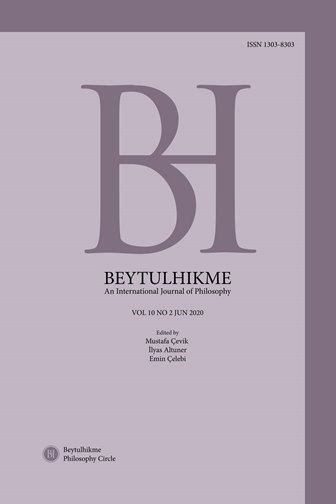Author :
Abstract
Bilimsel araştırma önermelerinin öznelerinde yalnızca türsel anlamları ve tanımları kullanmanın epistemolojik ilerlemeye engel teşkil ettiğinin farkına varan İbn Sînâ, anlamın tümelliği, tümel yükleme ve tümel bilimsel önermeyi metodik açıdan analiz ettiği el-Burhân’ın “İkinci Makale”sinin ilk dört faslında bütün bilimlerde kullanacağı bilimsel araştırma önermesinin şartlarını açıklar. Önermenin öznesi konumundaki tümel, ona göre, tasavvurdaki iştirakçilerinin ‘her bir’inin zatına doğrudan tüm zamanlarda geçerli olacak şekilde yüklenmeli ama tıpkı güneş tümeli gibi dış dünyada bir tekilinin var olması zorunlu olmamalı, olsa bile bir tek ve akıldaki tümel anlamının aynısı olmalıdır. O, bu tarz bir önermeyi bilimsel araştırmalarında kullanır ancak burada asıl önemli olanı, yukarıdaki tümeli Tanrı’nın tikeli kendisi sayesinde bildiği tümel olarak belirlemesidir. Söz konusu teori hakkında zamanımıza kadar yapılan tartışma ve eleştiriler, makalede, el-Burhân’ın belirlediği tümel muhtevasıyla yeniden analiz edilecektir.
Keywords
Abstract
Realizing that using of species meanings and definitions only as the subjects in the propositions of scientific inquiries constitute an impediment for epistemological improvements, Avicenna explains his conditions for the proposition of scientific inquiry that he will use in all sciences, in the first four chapters (al-fasl) of the Second Section (al-makalah) in al-Burhan which he methodically analyzes universality of the meaning, the universal predication, and the universal scientific proposition. According to Avicenna, the universal, as the subject in scientific propositions, must be predicated ‘directly’ to the essence of ‘each one’ of the participants in thought for ‘all times’ but not be necessary for any individual among them to exist outside, and even if it does, it must exist as the only one and be the same as the universal meaning in the mind, as the universal of the Sun. He uses such a uni-versal in his scientific inquiries, but more importantly, he designates this type of universal as the one by which God knows the particulars. In the article, I analyze some discussions and criticisms about the theory by the content of the universal specified by al-Burhan.
Keywords
- Adamson, P. (2005). On Knowledge of Particulars. Proceedings of the Aristotelian Society. New Series, 105, 257-278.
- Adamson, P. (2017). Knowledge of Universals and Particulars in the Baghdad School. Documenti e Studi sulla Tradizione Filosofica Medievale, 14, 141-164.
- Akkanat, H. (2016). Klasik Dönem İslam Felsefesinde Tümeller: İbn Sina Eksenli Bir Çözümleme. Adana: Karahan Kitabevi.
- Alexander of Aphrodisias (1992a). Quaestiones 1.1-2.15. (Trans. R. W. Sharples). Ithaca, NY: Cornell University Press.
- Alexander of Aphrodisias (1992b). On Aristotle’s Metaphysics 2&3. (Trans. A. Madi- gan). Ithaca, NY: Cornell University Press
- Aristotle (2002). Posterior Analytics. (Trans. J. Barnes). Oxford: Clarendon Press.
- Aristotle (1991a). De Interpretatione. (Ed. J. Barnes). The Complete Works of Aristotle. Princeton, NJ: Princeton University Press.
- Aristoteles (1991b). Metaphysics. (Ed. J. Barnes). The Complete Works of Aristotle.
- Erdoğan, Ö. F. (2014). Felsefe-Kelam Tartışmalarında Metin Tutarlılığı (İbn Sina- Gazzali Örneği). (Basılmamış YLT). Ankara: Ankara Üniversitesi.
- Gazâlî (1961). Mi‘yâru’l-‘İlm. (Tah. S. Dunyâ). Kahire: Dâru’l-Maârif bi-Matar.
- Gazâlî (2000). The Incoherence of the Philosophers. (A parallel English-Arabic text; trans. M. E. Marmura). Provo, Utah: Brigham Young University Press.
- İbn Sînâ (1956). Eş-Şifâ’: el-Burhân. (Tah. E. A. Afifî). Kahire: el-Hey’etu'l-Âmme li-Şuûni’l-Metâbii’l-Emîriyye.
- İbn Sînâ (1964). Eş-Şifâ’: el-Kıyâs. (Tah. S. Zâyid). Kahire: el-Hey’etu'l-Âmme li- Şuûni’l-Metâbii’l-Emîriyye.
- İbn Sînâ (2005b). Eş-Şifâ’: el-İlâhiyyât: The Metaphysics of the Healing. (A parallel English-Arabic text; trans. M. E. Marmura). Provo, Utah: Brigham Young University Press.
- İbn Sînâ (2006). Eş-Şifâ’: el-Medhal. (Arapça-Türkçe metin; çev. Ö. Türker). İstan- bul: Litera Yayıncılık.
- İbn Sînâ (2005a). El-İşârât ve’t-Tenbîhât. (Arapça-Türkçe metin; çev. A. Durusoy vd.) İstanbul: Litera Yayıncılık.
- Özdemir, M. (2012). Gazzâlî’nin Tehâfütü’l-Felâsife Adlı Eserinde “Üç Mesele”nin Ele Alınışı ve İbn Sînâ’nın Görüşleriyle Mukayesesi. (Basılmamış DrT). İstanbul: Marmara Üniversitesi.
- Philoponus, J. (2008). On Aristotle Posterior Analytics 1-1.8. (Trans. R. McKirahan). London: Duckworth & Co.
- Terkan, F. (2017). Tanrı ve Cüz’îlere Dair Bilgisi. Gazzâlî Konuşmaları. İstanbul: Küre Yayınları.
- Tweedale, M. (1984). Alexander of Aphrodisias’ Views on Universals, Phronesis, 3, 279-303. Öz: Bilimsel araştırma önermelerinin öznelerinde yalnızca türsel anlamları ve tanımları kullanmanın epistemolojik ilerlemeye engel teşkil ettiğinin farkına varan İbn Sînâ, anlamın tümelliği, tümel yükleme ve tümel bilimsel önermeyi metodik açıdan analiz ettiği el-Burhân’ın “İkinci Makale”sinin ilk dört faslında bütün bilimlerde kullanacağı bilimsel araştırma önermesinin şartlarını açıklar. Önermenin öznesi konumundaki tümel, ona göre, tasavvurdaki iştirakçilerinin ‘her bir’inin zatına doğrudan tüm zamanlarda geçerli olacak şekilde yüklenmeli ama tıpkı güneş tümeli gibi dış dünyada bir tekilinin var olması zorunlu olmamalı, olsa bile bir tek ve akıldaki tümel anlamının aynısı olmalıdır. O, bu tarz bir önermeyi bilimsel araştırmalarında kullanır ancak burada asıl önemli olanı, yukarıdaki tümeli Tanrı’nın tikeli kendisi sayesinde bildiği tümel olarak belirlemesidir. Söz konusu teori hakkında zamanımıza kadar yapılan tartışma ve eleştiriler, makalede, el-Burhân’ın belirlediği tümel muhtevasıyla yeniden analiz edilecektir. Anahtar Kelimeler: Tümel, tikel/tekil, tümel tarz, tanrısal bilgi, İbn Sînâ.





